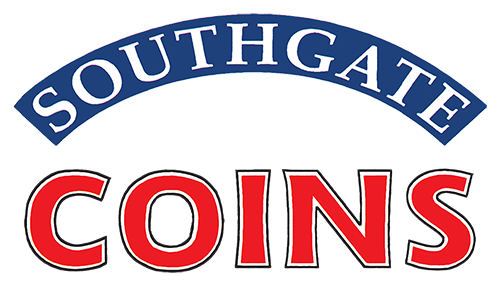← Back to Numismatic Education
Insights into Rare Coins
Coin Dealers Provide Helpful Guidance to Collectors
It seems that the rare coin market is [as of 2015] turning more to auctions as a retail method of buying and selling coins; but dealers can offer guidance and opportunities that auction houses can’t.
–Steve Roach, Coin World January 2015, pg. 36
Caution Advised when Buying Rare Coins
If you don’t consider yourself to be a competent grader (based on your success buying or selling coins), you should only purchase coins that have been evaluated by a major grading service.
–F. Michael Fazzari, Numismatic News December 30, 2014, pg. 18
Coins With Problems Offer Little Long-term Investment Potential
I advise students not to buy coins with problems, no matter how inexpensive they may be, because a problem-free coin should appreciate in value faster over time; but that is standard investment advice.
–F. Michael Fazzari's Making the Grade column, Numismatic News November 11, 2014, pg. 53
High Frequency Trading Not Healthy for Rare Coin Market
On August 8, 2014, hobby legend Q. David Bowers commented that coins in our hobby are being traded more frequently than in previous generations.
This new market velocity is clearly seen when coins from major collections return to the auction block after a holding period of perhaps a year or two, or even just several months!
–Steve Roach’s Market Analysis column, Coin World September 2014, pg. 32
Having a Trusted Guide and Advisor Crucial For Collectors
It is critical that collectors seek out knowledgeable individuals who are willing to share their experience and provide well-grounded advice.
–Gerry Fortin, 2013 Hall of Fame Inductee, Gobrecht Journal, Issue 120, July 2014,
Liberty Seated Collectors Club, pg. 33
Mass Quantities of Rare Coins Available on the Internet
The Internet has changed the face of numismatics forever. At any given moment, hundreds of thousands of rare coins are available for sale on the Internet—many of them through online auctions. The variety of material being offered on the Internet is incredible and greater than you will ever find at any coin show. In fact, I know of many collectors and dealers who have literally quit going to coin shows—instead, they are able to buy and sell every coin they need over the Internet.
–Coin Collecting for Dummies, Ron Guth, pgs. 114-115, Hungry Minds, Inc., 2001
Four Factors That Affect the Value of Rare Coins
[1] Condition: The condition [or grade] of a coin is a hugely important factor in determining its price. The difference in a single point on the grading scale can equate to a difference of thousands of dollars in value....
[2] Demand: Demand is an important factor in determining the value of a coin. High demand increases values and low demand hurts values....
[3] Rarity: The rarity of a coin relates to the number of examples that have survived through time....
[4] Supply: ...If a coin’s supply falls short of demand, prices rise.... [On the other hand] the price drops [if] the supply rises to meet the demand....
–Coin Collecting for Dummies, Ron Guth, pgs. 27-30, Hungry Minds, Inc., 2001
Shades of the Past Pump Enthusiasm Into Coin Collecting
[If for instance I wanted to] learn about the Morgan dollar era, in my spare time I would read about the era of Morgan silver dollars, especially the years from 1878 to 1904, when the early series coins were made. I would learn about the ‘silver question,’ which was a key part of American politics, to acquire an ‘I am there’ feeling and relationship with the time. How were silver dollars used? What was their purchasing power? Were they used all over America, or were they more popular in certain geographical areas?
–A Buyer’s Guide to the Rare Coin Market, by Q. David Bowers,
Bowers and Merena, Wolfeboro, NF 1992, pg. 57
Reading About Numismatics Raises Level of Knowledge
And though there is no way to become [an] expert overnight in even so well explored a field as United States numismatics, there is a way to raise your own level of knowledge from that of a neophyte and swindlers’ mark to—at least—[an] informed amateur. And this is to read before you buy.
–Walter Breen’s Encyclopedia of United States and Colonial Proof Coins – 1722-1977,
by Walter Breen, F.C.I. Press, New York, 1977, pg. 1
What to Expect and Not to Expect from Collecting Rare Coins
There is no way to Get Rich Quick in this field [rare coins]—otherwise, instead of writing this book I would have been stashing every spare cent since 1950 into coins ... but there is a way to manage your collection rationally so that at the very worst the possessions which gave you a lot of fun over the years will have cost you little or nothing, but more likely, you will have made more than you put in, and quite possibly you will have made a tidy profit.
–Walter Breen’s Encyclopedia of United States and Colonial Proof Coins – 1722-1977,
by Walter Breen, F.C.I. Press New York, 1977, Pg. III
Categorizing Rare Coins
Generally speaking, coins may be attributed on the basis of eight characteristics:
- Major series
- Denomination
- Minor series
- Type
- Date
- Mintmark
- Variety
- Condition [grade]
–Scott Catalogue and Encyclopedia U.S. Coins, Don Taxay, Joseph H. Rose, Howard Hazelcorn,
editors, Scott Publishing Co. New York, NY 1976, pgs. XVI-XVII.
